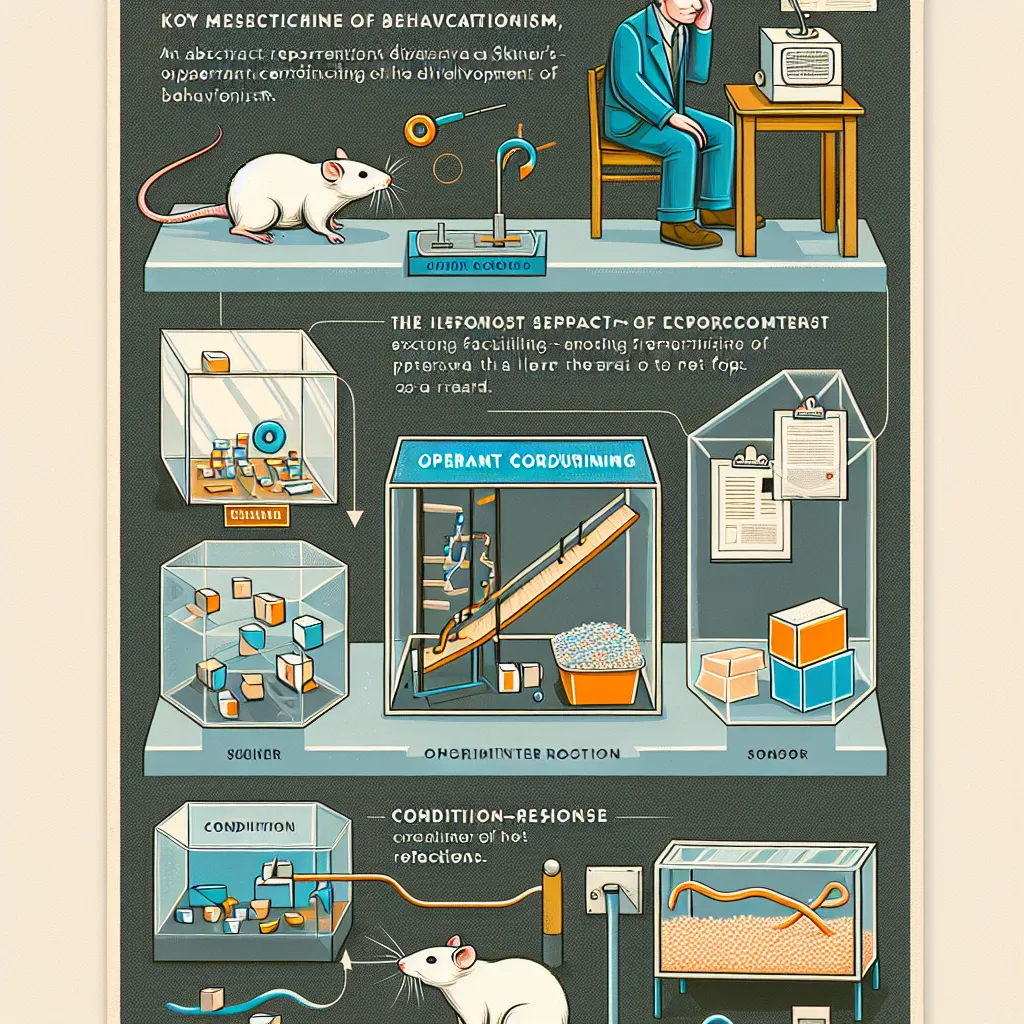B. F. Skinner and the Development of Behaviorism
The field of psychology has been shaped by numerous theories and schools of thought over the years, but few have been as influential and controversial as behaviorism. One of the key figures in the development of behaviorism is B. F. Skinner, whose work has left a lasting impact on psychology, education, and even popular culture. This article delves into Skinner’s life, his contributions to behaviorism, and how his ideas have shaped the way we understand human behavior.
Burrhus Frederic Skinner, often referred to as B. F. Skinner, was born on March 20, 1904, in Susquehanna, Pennsylvania. He was a highly influential American psychologist, author, inventor, and social philosopher. Skinner’s fascination with the inner workings of the human mind and behavior led him to develop some of the most important concepts in the field of psychology. Skinner’s approach to psychology was unique in that he focused solely on observable behavior, rather than on internal thoughts and feelings.
During his lifetime, Skinner attended Hamilton College and later Harvard University, where he received his Ph.D. in Psychology. It was at Harvard that Skinner began his extensive research on behaviorism. His work was largely influenced by the earlier work of John B. Watson and Ivan Pavlov, who introduced the foundational concepts of behaviorism and classical conditioning, respectively. However, Skinner would soon become the most prominent figure associated with behaviorism through his concept of operant conditioning.
Operant conditioning is a method of learning that employs rewards and punishments for behavior. According to this theory, behaviors that are followed by positive outcomes tend to be repeated, while behaviors followed by negative outcomes are less likely to be repeated. Skinner’s analysis of human behavior culminated in his work with the Skinner Box, also known as the operant conditioning chamber. This device allowed Skinner to study the learning processes of animals—most often rats and pigeons—and make inferences about human behavior based on these experiments.
One of the core principles arising from Skinner’s research is the idea of reinforcement. Skinner identified two types of reinforcements—positive and negative. Positive reinforcement involves adding something pleasant following a behavior, while negative reinforcement involves removing something unpleasant. Both types of reinforcement increase the likelihood that the behavior associated with them will be repeated. Skinner also explored schedules of reinforcement, noting that behaviors could be established more firmly through variable schedules of rewards rather than through constant rewards.
Skinner’s ideas had far-reaching implications, not just in psychology but also in education and behavior modification. His belief that behavior is determined by its consequences has led to the development of instructional strategies such as programmed instruction and the use of reinforcement in classroom management. Skinner advocated for teaching machines and personalized learning that could allow students to progress at their own pace—a concept that resonates with contemporary movements towards adaptive learning technologies.
Another significant contribution from Skinner is his concept of shaping. Shaping involves gradually modifying behavior by consistently reinforcing desired behavior and ignoring or not reinforcing undesired behavior. This process has been widely used in therapy, animal training, and various behavior modification programs.
Skinner’s influence extended beyond the realm of psychology into the broader culture. His novel, “Walden Two,” published in 1948, depicts a utopian society based on his behavioral principles. Moreover, through his book “Beyond Freedom and Dignity” (1971), Skinner challenged traditional beliefs in free will and autonomy, arguing that behaviors are shaped by environmental factors and that society could benefit from the application of behaviorist principles. These publications provoked debates about human nature, freedom, ethics, and the role of science in human affairs.
Despite the vast influence of Skinner and behaviorism, the approach has garnered its share of criticisms. Some have argued that behaviorism is too reductionist, ignoring the complexities of thoughts, emotions, and cognitive processes. Others have criticized its deterministic viewpoint or raised ethical concerns about manipulating behavior. However, even these criticisms attest to the importance of behaviorism in provoking thought and discussions about human nature and the science of psychology.
As the field of psychology has evolved, cognitive approaches that emphasize internal mental processes have gained prominence. Yet, the contributions of Skinner and the behavioral perspective continue to play an integral role in applied disciplines such as clinical psychology, education, and organizational behavior management. Behavior analysis, a field largely grounded in Skinner’s work, remains a robust area of study and practice, particularly for developmental disorders such as autism.
Moreover, the principles of behaviorism can be seen in everyday situations and technology. From reward systems in video games and apps to the structure of employee incentives in the workplace, Skinner’s work has left an indelible mark on society. The use of data analytics and algorithmically personalized content in technology platforms can also be viewed as extensions of behaviorist principles.
In summary, B.F. Skinner’s contributions to the development of behaviorism have fundamentally shaped the study of human behavior. His research on operant conditioning, reinforcement, shaping, and the application of behaviorist principles have had a profound effect across many facets of society. While behaviorism has evolved and been integrated with other psychological theories, the foundational work of Skinner remains a testament to the power of observing, understanding, and influencing behavior. As we continue to apply these principles in various aspects of life, we can appreciate the visionary work of B. F. Skinner and how it has shaped the field of behaviorism.



Leave a Comment